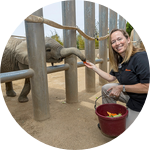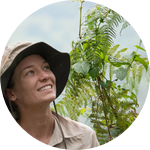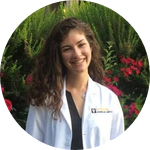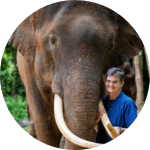About This Project
Elephant endotheliotropic herpesvirus hemorrhagic disease (EEHV-HD) is the leading cause of death of young Asian elephants in the west, and suspected to occur in Myanmar. To validate if alternative methods can be used for the detection of EEHV, we will collect noninvasive samples from 2 captive and one wild elephant herd and determine the presence of EEHV using qPCR. To advance the study of EEHV epidemiology in Myanmar, we will conduct training for 25 Myanmar veterinarians.
Ask the Scientists
Join The DiscussionWhat is the context of this research?
The leading cause of death of young Asian elephants in North America and Europe is elephant endotheliotropic herpesvirus hemorrhagic disease or EEHV-HD. EEHV can cause a rapidly fatal hemorrhagic disease, which has little treatment success. We don't know what the prevalence of this disease is in Myanmar. We will collect fecal samples and discarded chewed plants from elephants in Myanmar to evaluate these methods for the detection of EEHV in range countries. Our goal is to develop methods and conduct training of Myanmar veterinarians that will allow us to utilize the extensively managed captive elephant herds in Myanmar to better understand risk factors for the disease.
What is the significance of this project?
EEVH-HD is the most important infection cause of mortality in Asian elephants. Non-invasive testing methods will facilitate the study of EEHV in elephants in Myanmar, home to the second largest number of both working and wild elephants in the world, and an invaluable resource for understanding EEHV disease epidemiology. Understanding the transmission dynamics of this disease is critical. It will allow conservation resources to be allocated towards mitigating environmental and/or husbandry related contributions to the disease, and reduce the impact of EEHV on Myanmar elephants. Elephants are an integral part of human livelihoods, society and commerce in Myanmar, making EEHV significant for both people and elephants throughout the region.
What are the goals of the project?
The goal of this project is to validate the use of two sample types, feces and discarded chewed plants, for the detection of EEHV shedding in captive and free-ranging Asian elephant herds in Myanmar. We will collect non-invasive sample types from Myanmar Timber Enterprise elephants along with demographic and behavioral data over one monsoon and one dry season. Samples will be tested for EEHV using qPCR in Myanmar, and results used to optimize field protocols for viral detection as well as identify risk factors for disease. This project will support the training of 25 Myanmar Timber Enterprise elephant veterinarians and 4 diagnostic veterinarians during our upcoming Myanmar Elephant Healthcare Workshop.
Budget
We are requesting funds for domestic travel and accommodation for 25 Myanmar elephant veterinarians to attend our training workshop on elephant healthcare and EEHV diagnosis and treatment, scheduled in February 2020. During this workshop we will cover EEHV clinical recognition and diagnostics, basic elephant healthcare topics, and study protocols for long term sample collection and demographic data collection to better understand the epidemiology of EEHV in Myanmar. We also request funds for training materials (PCR reagents, laboratory consumables, and training books) for a workshop with the local veterinary laboratory on the diagnosis of EEHV by real-time and conventional PCR. Both of these training efforts will make our pilot research project, where we will be testing two captive elephant herds and one wild elephant herd for EEHV, possible, as well as our long term goals of conducting a population wide study of the epidemiology of EEHV in elephants throughout Myanmar.
Endorsed by
 Project Timeline
Project Timeline
Sample collection of Myanmar elephant herds will begin in February. Sampling will occur once per week, and every individual in the herd will be sampled, for six weeks during both monsoon and dry seasons. Three elephant herds will be targeted (1 tourist, 1 semi-free-ranging, and one free-ranging herd). We are planning a comprehensive three day training workshop for Myanmar elephant veterinarians and veterinary diagnosticians participating in the study in mid-February.
Jan 07, 2020
Project Launched
Feb 01, 2020
Elephant Sample Collection Dry Season
Feb 12, 2020
EEHV Diagnostics Workshop in Myanmar
Feb 19, 2020
Myanmar Elephant Healthcare and EEHV Workshop
Mar 13, 2020
Report to Backers on Workshop
Meet the Team
Affiliates
Tierra Smiley Evans
I am a veterinary epidemiologist at the Karen C. Drayer Wildlife Health Center (WHC) at the University of California, Davis. My research is focused on novel methods for non-invasive wildlife health diagnostics. I have developed several techniques for non-invasive viral surveillance in wildlife including a technique to recover herpesviruses from discarded chewed plants. I molecularly described the first beta and gamma herpesviruses detected in mountain gorillas and used discarded chewed plants to show the epidemiologic similarities between mountain gorilla and human herpesvirus transmission. I have experience leading wildlife health projects in Rwanda, Uganda, Nepal and Myanmar and now lead the WHC’s collaborative project with the government of Myanmar and the National Institutes of Health, investigating viral sharing between humans and wildlife in elephant logging camps in Myanmar.
Alison Jeffrey
I am a third-year veterinary student at the University of California, Davis, School of Veterinary Medicine. My professional interests include wildlife, zoo, and conservation medicine. My long-term career goal is to contribute to the resolution of conservation issues surrounding threatened species both domestically and internationally by incorporating clinical work and wildlife research projects into a veterinary career. I am excited to be starting this career path by contributing to the study of elephant endotheliotropic herpesvirus in Asian elephants.
Janine Brown
I am a research biologist with over 30 years of experience conducting wildlife research that leads to better management and conservation of endangered species. I have developed techniques to measure hormones and other biomarkers in serum, plasma, urine, feces, hair and saliva of dozens of species, and in doing so have amassed an extensive database demonstrating the diversity of reproductive, health and stress response mechanisms that exist in the natural world. I am a world authority on elephants, and as the Reproductive Advisor to the Elephant Taxon Advisory Group, my laboratory plays a key role in ex situ management plans for Asian and African elephants in the United States. I also conduct collaborative research on reproduction, health and welfare of elephants in range countries, including Thailand, Sri Lanka, Laos and Myanmar, and provide advice and direct research assistance to improving management of captive elephants around the globe.
Zabe Ho
I grew up in the 'urban jungle' but was inspired by my grandfather U Chain Ho, the Chief Conservator of Myanmar Forest (1948-1962) and hence, fell in love with nature, the forest and elephants. I have been working in the Tourism industry as a French speaking tour guide since 2002. I operate an ethical, hands-off elephant/oozie educational experience (“Life in Oozie Village Ecohut” L.O.V.E.) at Elephant Hospital under the umbrella of Myanmar Timber Enterprise, Ministry of Natural Resources and Environmental Conservation.
This ethical tourism project creates opportunities for oozies and their families to learn new skills and feel a stronger sense of purpose in caring for this important endangered species. Visitors can observe elephants in their natural habitat and can learn about the unique relationship between the oozies and elephants who live in harmony with the forest. More recently, I have became involved with hosting and assisting in organizing educational workshops which can be of great benefit to the Burmese veterinarians who care for elephants. The workshops are designed to share international expertise on topics related to elephant management, diagnostics and clinical care.
Christine Molter
I am a staff veterinarian at the Houston Zoo in Houston, Texas and coordinate the zoo's EEHV collaborations. The Houston Zoo is a leader in the global movement to save wildlife and is dedicated to EEHV research, clinical case management, and international working group support. I earned my DVM at the University of Wisconsin in 2011 and completed a residency in Zoological Medicine through the University of California, Davis and San Diego Zoo Global in 2015. I became a Diplomate of the American College of Zoological Medicine in 2016.
Maya Iyer
I am a second-year veterinary student at the University of California, Davis, School of Veterinary Medicine. My interest in EEHV started at an early age, as I grew up in Houston, Texas following the work of the Houston Zoo and Baylor College of Medicine on captive and wild elephant health. My primary career interest is in zoological and conservation medicine, and I am excited to be involved in the furthering of EEHV research at this early stage in my career.
Additional Information
We are holding a Myanmar Elephant Healthcare Workshop February 16th - 18th at the Myanmar Elephant Hospital in the Bago Yoma region of Myanmar.
With generous contributions of staff expertise from the Houston Zoo, University of California Davis, Wildlife Reserves Singapore, Smithsonian Conservation Biology Institute and the Oregon Zoo we have an amazing lineup of veterinarians, pathologists, clinical diagnosticians and endocrinologists to provide training at this important event.
The workshop will cover clinical diagnostics and care for Elephant Endotheliotripic Herpesvirus Hemorrhagic Disease and other health topics of great importance for our Myanmar colleagues such as wound management techniques, clinical pathology methods and evaluating endocrine markers of stress and disease in elephants.
Project Backers
- 33Backers
- 108%Funded
- $4,084Total Donations
- $63.15Average Donation






